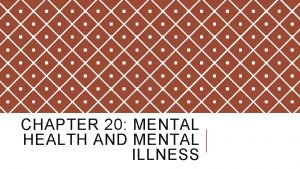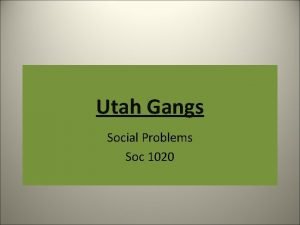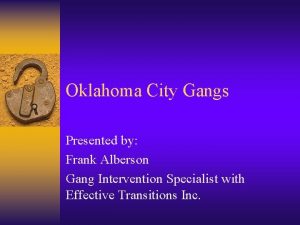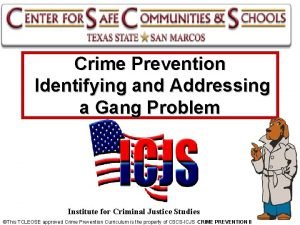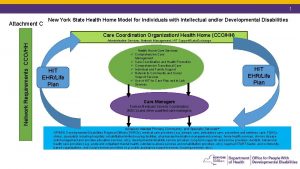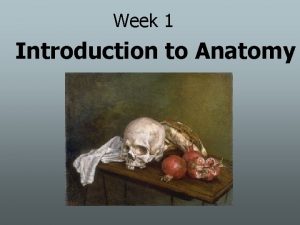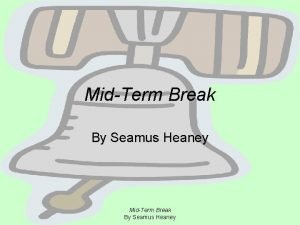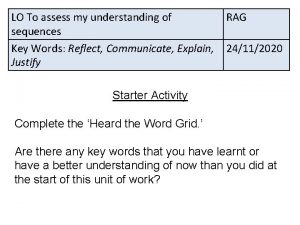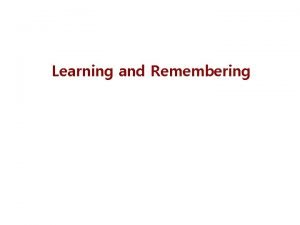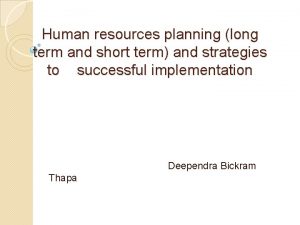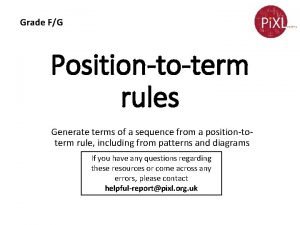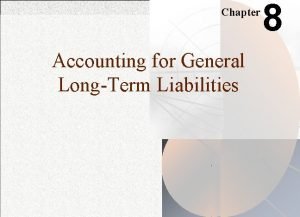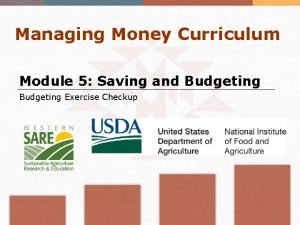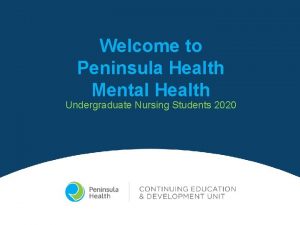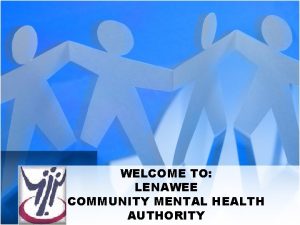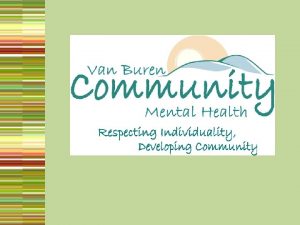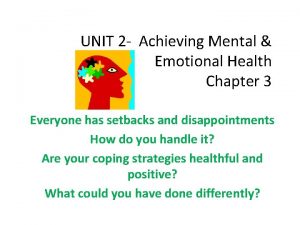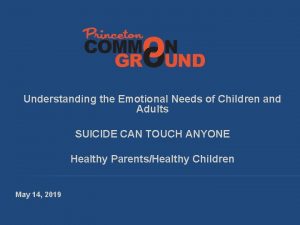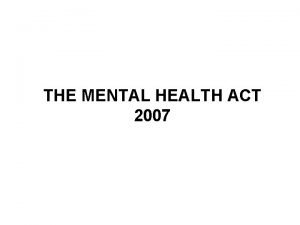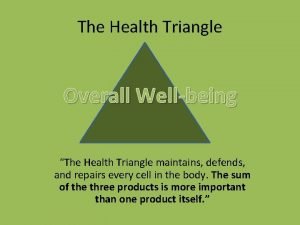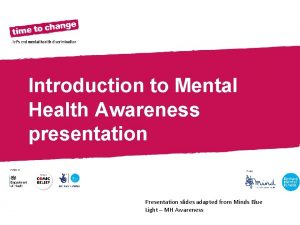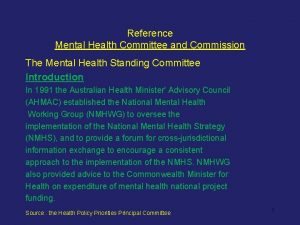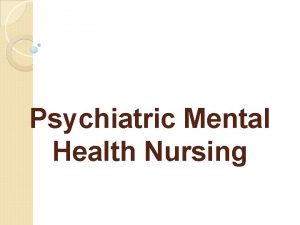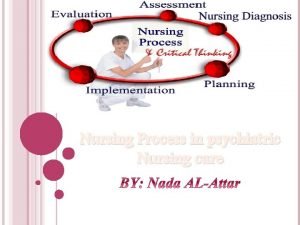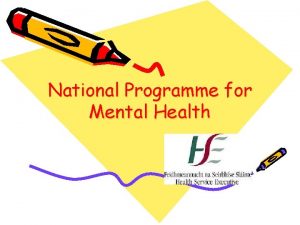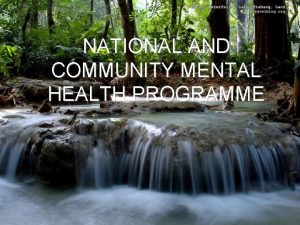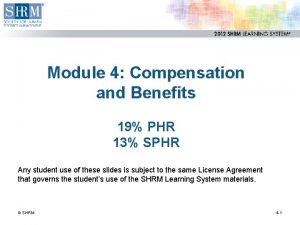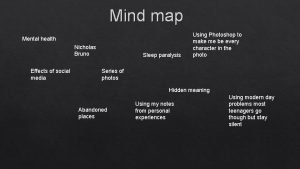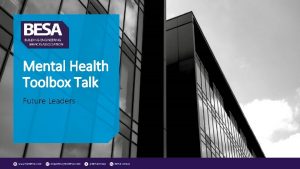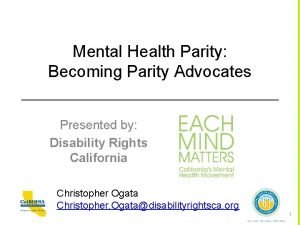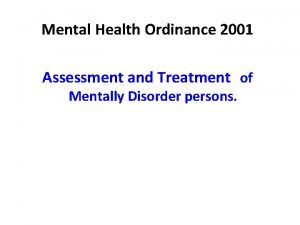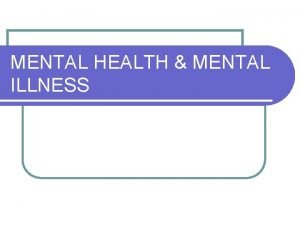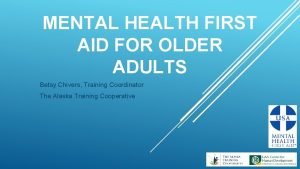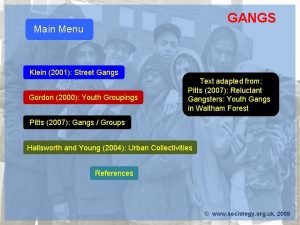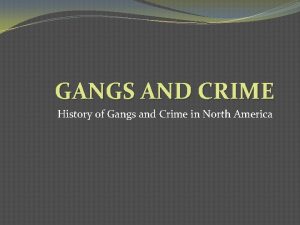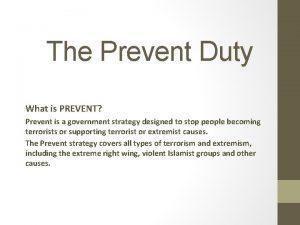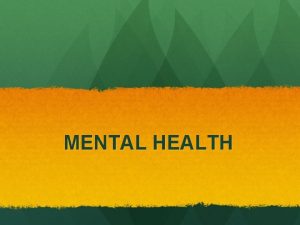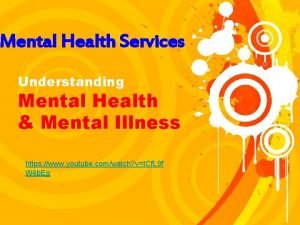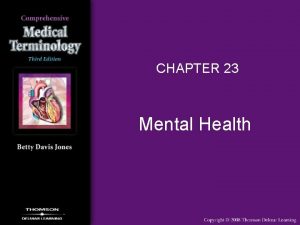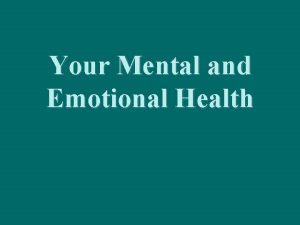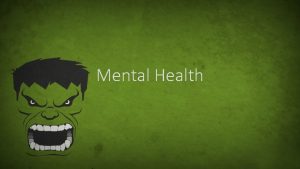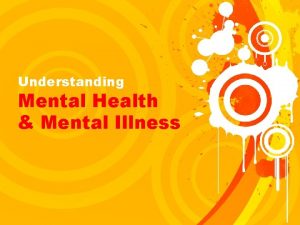Term 2 themes Secondary Mental Health Prevent Gangs




















































- Slides: 52

Term 2 themes Secondary Mental Health Prevent Gangs and Crime Restorative Justice

PREVENT at BGGS Yusuf Shah

What we do at present • PSHE programmes of study in both main school and Sixth Form – Spiritual, Moral, Ethical, Social (SMSC) issues and promoting British Values • • • ‘Thought for the day’ PCSO workshops on internet security, grooming and radicalisation (KS 4) Home Office approved WRAP trainer based in school Tapestry theatre-in-education workshops for Year 9 groups ‘Building resilience through effective dialogue’ workshops (Year 12) – understand what resilience means. – understand how debate and discussion can be used to build resilience around safeguarding issues. – identify what can be done and the support/guidance available for dealing with issues impact on personal well-being • Women Against Radicalisation Network (WARN) presentation on issues that lead to radicalisation (Year 13)

What we are aiming for • Staff training on delivering Youstuff lessons – Pilot lesson delivered by A Ali at BGGS with a Year 9 class – website for 14 -16 year-olds providing essential life skills required to stay safe, healthy and informed, whilst encouraging community cohesion and building resilience – Form tutors delivering the first Youstuff module through PSHE lessons on the issue of ‘grooming’ in terms of radicalisation and child sexual exploitation • Parent and community engagement through monthly coffee mornings – Insight into WRAP training and workshops delivered to students – meeting with key community figures involved in the Channel programme • Sharing practice and providing support to schools at the BGGS Teaching and Learning Conference on Friday 3 rd March 2017 • Shamaal Project drama workshops with KS 3 and KS 4 – utilise classical texts (Macbeth, Great Expectations, The Lord of the Flies and Frankenstein) to promote fundamental British Values • Proposed federation with Marlborough Junior School

Rockwood Academy Keeping safe from radicalisation and extremism Ayisha Ali Year 7 -8 lesson


https: //www. youtube. com/watch? v=w. BQp 9 MYlbc 4

A detailed look at stress on the body. Our ‘fight or flight’ part of the brain has given us the ability to use stress to face life threatening situations. But a long term exposure to stress can have negative effects on your body. Headaches and sleep issues Diabetes Blood pressure issues IBS, stomach cramps and constipation Tensions in joints Acne

Stress

�Work �Relationships �Exams �Worries �Guilt �Pressures

A report by Child. Line highlighted: Worries at school came 7 th in a list of the most calls received by the charity – nearly 35, 000! In the year 2015 -16, Childline carried out 3, 077 counselling sessions about exam stress It came above other types of issues such as friendship and those to do with relationships.

Write down what you do when you feel anxious which helps you become less stressed

If you think you are stressed, try to: ü Take time out from your work if you are over-doing it. Find time to do something you enjoy. ü Alternatively, if you are stressed due to not doing enough, get going. ü Exercise – this promotes the release of hormones that actively counter stress. ü Eat well – you know what you need to eat. Try to overcome those impulsive binges on sugar and saturated fat. Bananas = brain food ü Watch something funny! ü Get enough sleep – this does not mean lying in bed watching TV, playing games, texting … ü Find someone you trust to talk to about how you feel – a problem shared. ü https: //www. youtube. com/watch? v=hnp. Qr. Mq. Doq. E

People and organisations that can help you…. Speak to a trusted adult- this may be someone at home or a teacher, perhaps your form teacher, Head of Year or Learning Mentor. MIND- www. mind. org. uk www. nhs. uk Childline- 0800 1111 or download the Childline app.

Lesson resource that you can use!

Learning Objectives: To gain an understanding of mental health issues Article 2: The Convention applies to all children Article 12: Resect for the views of the child Article 13: right to freedom of expression as long as it is within the law

Starter: Ground Rules • Mental Health issues and the way people are treated and stigmatised are serious issues. • What ground rules do you think we need to establish before starting this lesson to create a sensible and sensitive learning environment? • Discuss in groups of four for three minutes

Ground rules- the absolute essentials • Confidentiality - you can talk about the session but don’t talk about personal things or names that have been shared in order to create a safe space. • Try to participate • Respect – challenge the statement not the person • Listen • Do talk to Mrs Arrandale or Miss Steadman or another adult if you need support after a lesson

Hands Up! • Do you have physical health? • Do you have mental health? • Have you felt happy at some point during the last week? • Have you felt stressed at any point in the last week? • Have you felt sad at any point in the last week?

What is mental health? Mental Health problem/illness In your groups, write down on the post-its what words, positive and negative, come to mind when you hear these terms. Everyone should contribute at least one post-it not within the group. Then stick the post-it on the relevant place on the board. 5 minutes 20

“Have I ever… Experienced a Mental Health problem? ” Yes You are going to be shown a number of celebrities. For each one, you need to stand on the Yes or No side. You are not allowed to be in middle/I don’t know. No

Celebrities who have a mental illness Does anyone know who this is? His name is Alistair Campbell and he used to work former Prime Minister Tony Blair. He is an active supporter of mental health charities. • http: //www. time-to-change. org. uk/news-media/celebritysupporters/alastair-campbell

Quiz • How many young people will experience a mental health problem in any one year? – A. 1 young person in every 10 – B. 1 young person in every 100 – C. 1 young person in every 1000 • What are the most common mental health problems experienced by young people? – A. Schizophrenia – B. Depression, anxiety, self-harm, eating disorders – C. Bipolar

Quiz – What are the two biggest causes of death of males aged 14 to 25? – A. Cancer and diabetes – B. Accidents and fire – C. Road Traffic Accidents and Suicide – How many people in society have a diagnosis of schizophrenia? – A. 1 in 100 people (adults and young people from the age of 14) – B. 1 in 1000 – C. 1 in 10, 000

Facts and Figures • 1 in 10 young people aged 5 – 16 suffer from a diagnosable mental health disorder. • Young people suffering from anxiety in childhood are 3. 5 times more likely than others to suffer depression or anxiety in adulthood. • Refugee and asylum-seeking young people have more risk factors for poor mental health than other children. • The majority of people recover from mental health problems, especially if they’ve sought help early *ONS 2004 **Sheffield CAMHS Partnership Strategy Summary Document, 2007 -2010

Why do people develop mental health problems? • Some people feel it is a chemical imbalance • Some feel it is all about trauma (everyone has a personal story of trauma, abuse, grief, separation loss etc) • Some feel it is about deprivation • There a lot of views but it is important that the individual’s own view is listened to, considered important and respected • There is no one answer

Some types of mental health problems • Depression – low mood, hopelessness, loss of energy • Anxiety disorders – sense of worry, panic, dread on a level that has a negative impact on the person’s life • Eating disorders – sometimes distorted view of body shape and weight – not just about dieting. Often low self esteem or control. • Self harm – often a way of coping with emotional difficulties. • Psychosis – change of reality. Sometimes hearing voices and seeing things that others don’t see / hear. May feel paranoid. For more information: www. rethink. org www. mind. org www. seemescotland. org

True or False? • • Write down T or F in your exercise book 1) Anyone can have a mental health problem 2) Mental health problems are rare 3) There are ways you can help yourself feel better if you feel bad • 4) People with mental health problems are different from other people • 5) It is best not to talk to someone with a metal health problem

True or false? • 6) One in four people will ask for help with a mental health • 7) You can recover from a mental health problem like bipolar disorder • 8) Someone who has a mental health problem can’t go to work • 9) People with mental health problems can overcome their difficulties.

True or False? Answers • • • 1) Anyone can have a mental health problem True 2) Mental health problems are rare False 3) There are ways you can help yourself feel better if you feel bad True 4) People with mental health problems are different from other people False 5) It is best not to talk to someone with a metal health problem False

True or false? • • 6) One in four people will ask for help with a mental health True 7) You can recover from a mental health problem like bipolar disorder True 8) Someone who has a mental health problem can’t go to work False 9) People with mental health problems can overcome their difficulties. True

Quotes “Many people make jokes about depression / bi-polar / other disorders and it can make people feel isolated. I was constantly picked on and called ‘emo’ because I was depressed. When people saw scars on my arms everyone made snide comments because they had no understanding. ” “Young people are afraid to admit to having a mental problem through fear and shame. Many people end up suffering in silence until something drastic happens. ” www. time-to-change. org. uk/young-people-programme Children and young people’s programme development. Summary of research and insights health

The Stand –Up Kid • https: //www. youtube. com/watch? v=SE 5 Ip 60_HJk • Watch the clip.

Group Work: • You have five minutes to complete the task assigned to you which is based on a section of the film.

What stigma feels like • https: //www. youtube. com/watch? v=z 2 j 43 Fp 9 IGc • Watch the clip

What can you do to help a friend? • https: //www. youtube. com/watch? v=Bu. H_d. I 7 Iw 78

60 second Challenge!! • In pairs, what ways can you think of to support someone who is experiencing a mental health problem? End 60 59 58 57 56 55 54 53 52 51 50 49 48 47 46 45 44 43 42 41 40 39 38 37 36 35 34 33 32 31 30 29 28 27 26 25 24 23 22 21 20 19 18 17 16 15 14 13 12 11 10 9 8 7 6 5 4 3 2 1

What can you do to help a friend? • https: //www. youtube. com/watch? v=Lzs 57 q. NYg 08

How you can help “Sometimes he just knew. He’d give me a big hug and I’d feel safer and happier for it. ” Lauren “He was there for me in my hardest time. He’d text me to chat about the telly and other normal stuff. ” Rob “Something as simple as a text can turn a bad day into a good day. ” “I let her know that I was there to have a laugh or to listen – whatever she wanted. ” Su Victoria


Plenary • Complete the gapped worksheet and fill in the blanks. • Three minutes

The promotion of SMSC through restorative practice Holte |School

What is i. Peace? • • i. Peace is an innovative approach to behaviour management founded upon the principles of restorative approaches to conflict. i. Peace has been developed by Dr Cremin, University of Cambridge and has been developed in the UK, Brazil and Australia. i. Peace is a toolkit for schools on how to effectively manage conflict in all forms. i. Peace involves the whole school community, parents and the wider community. ‘dedicated to learning as the foundation for life’

Why i. Peace? • • • develop a better understanding of conflict in our school, including low level disruption in the classroom; identify and use appropriate conflict resolution strategies that can be used in the classroom; work towards more peaceful and productive learning environments, homes and communities; provide opportunities for students to develop as active citizens in all communities. Eradicate hypermasculinity. promote an authoritative approach to behaviour management that is based on education, relationships and actively promotes social skills. ‘dedicated to learning as the foundation for life’

i. Peace vs. behaviourist approaches i. Peace combines both high control and high support and is characterized by doing things with people, rather than to them or for them ‘dedicated to learning as the foundation for life’

Our journey… • i. Peace/restorative approaches clearly defined within our BFL policy. • Annual training provided for staff. Part of induction for NQTs and new staff. • i. Peace ‘action group’ including SLT, teachers, support staff, and a governor. • Mediation and restorative conversations between pupils/pupils, staff/pupils and staff/staff. • Fully accredited peer mediation service available for everyone within our community. • The use of restorative language in classrooms. ‘dedicated to learning as the foundation for life’

Our journey… • Pupils complete restorative reflection forms in pupil office and Internal Exclusion, to encourage them to think about what they have done. • i. Peace within our PSHE and Citizenship programme of study. • Collaborative work with local youth groups. • Peer mediation at Lozells and in the local community. • Referrals to West Midlands Police RJ service ‘dedicated to learning as the foundation for life’

Peer Mediation • Peer mediators trained annually. Application process, including an interview. • Peer mediators have been trained by the College of Mediators. • Twenty Peer mediators have ongoing training provided by Ph. D students from Cambridge. • Each are assigned to one year group and 4 peer mediators are assigned to the primary school onsite. • There are 5 stages of peer mediation that the pupils go through. ‘dedicated to learning as the foundation for life’

The importance of Mediation • • • Students are able to resolve their own conflicts Empowers students Teachers not having to deal with as much low level disruption Peer Mediators themselves are able to learn essential life skills The school climate has improved to become even calmer ‘dedicated to learning as the foundation for life’

The impact of i. Peace • No ‘them and us’, relationships are key and behaviour has to be taught • Student’s SMSC development is promoted at all times within the culture of the school. • Improved behaviour - reduction in fixed term exclusions, (incl. repeat exclusions), low level disruption, physical aggression and bullying. • Reduction in hypermasculinity. • Student leadership opportunities elicits a tangible community spirit. ‘dedicated to learning as the foundation for life’

Next steps… • • • i. Peace parenting programme i. Peace working actively within the community Increase links with feeder primary schools Further develop restorative conferences Participation in project with Cambridge University and Ugandan schools around supporting newly arrived refugee students who have experienced conflict. • Positive Peace in Schools: Tackling Conflict and Creating a Culture of Peace in the Classroom” by Dr Hilary Cremin, Terence Bevington ‘dedicated to learning as the foundation for life’

ARC lead training for peer mediators in schools. Their two day training programme is fully accredited by the College of Mediators. www. arcresolution. co. uk
 Chapter 20 mental health and mental illness
Chapter 20 mental health and mental illness Mental health jeopardy questions
Mental health jeopardy questions Lay low crips salt lake city
Lay low crips salt lake city Two bit mathews description
Two bit mathews description Gangs in pueblo co
Gangs in pueblo co South side locos
South side locos Victorian london gangs
Victorian london gangs Woodgrange gang
Woodgrange gang Common graffiti symbols
Common graffiti symbols Nortenos in utah
Nortenos in utah Gang hand signs
Gang hand signs Gangs of new york cda
Gangs of new york cda Mental anatomical term
Mental anatomical term Ventral cavity
Ventral cavity Abdominopelvic cavity regions
Abdominopelvic cavity regions Seamus heaney poem mid term break
Seamus heaney poem mid term break Long medium and short term planning in primary schools
Long medium and short term planning in primary schools Term-to-term rule
Term-to-term rule Long term memory vs short term memory
Long term memory vs short term memory Quadratic sequence formula
Quadratic sequence formula Short term and long term human resource planning
Short term and long term human resource planning Position-to-term
Position-to-term Difference between long term and short term liabilities
Difference between long term and short term liabilities Long-term liabilities examples
Long-term liabilities examples Minterms and maxterms 4 variables
Minterms and maxterms 4 variables Rules in finding the nth term
Rules in finding the nth term Term to term rule
Term to term rule Long term goal
Long term goal Short term finance planning
Short term finance planning Met call vs code blue
Met call vs code blue Lenawee community mental health authority
Lenawee community mental health authority Van buren county cmh
Van buren county cmh Chapter 3 lesson 3 expressing emotions in healthful ways
Chapter 3 lesson 3 expressing emotions in healthful ways Together for mental health
Together for mental health What is mental health act 2007
What is mental health act 2007 Emotional health examples
Emotional health examples Introduction to mental health awareness presentation
Introduction to mental health awareness presentation Mental health committee
Mental health committee Wellness in mind nottingham
Wellness in mind nottingham Mental health definition in nursing
Mental health definition in nursing Nursing diagnosis three parts
Nursing diagnosis three parts Mental health programme
Mental health programme Objectives of mental health programme
Objectives of mental health programme Mental health equity
Mental health equity How to make a mind map in photoshop
How to make a mind map in photoshop 2016494500
2016494500 Mental health toolbox talk construction
Mental health toolbox talk construction Golden thread clinical documentation
Golden thread clinical documentation Mental health equity
Mental health equity Mental health ordinance
Mental health ordinance Schizophrenia def
Schizophrenia def Learning outcomes definition
Learning outcomes definition Mental health and older adults
Mental health and older adults
